

In order to improve the future opportunities for schoolchildren, more and more education partnerships are being arranged between schools and libraries, museums, adult education centres and other cultural institutions at the initiative of the NRW state government.
Museums and schools have an obligation to communicate knowledge, social life orientation and cultural education. The immediate encounter with the authentic place, the original evidence and the diverse media in museums promotes cultural competence and enriches and complements the school teaching structures in an ideal manner. Through systematic co-operation planned for the long-term between the two institutions, the aim is to optimise the communication of information and cultural competence in both museum and school and to establish a strategic education partnership. The reason being: "Museums provide a high level of potential for individual, targeted but also informal learning and for creative, innovative and socially responsible action." (Bundesverband Museumspädagogik e.V. (Federal Association for Museum Education)).
The LVR-Industriemuseum has currently nine partnerships with schools.
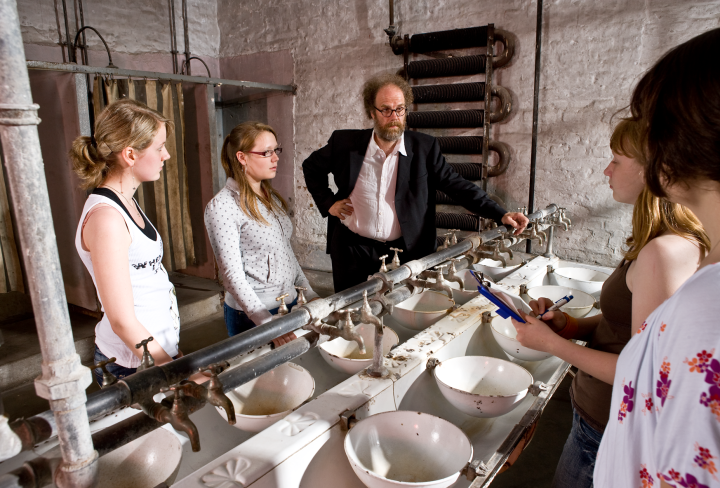
The aim of this co-operation with the Humboldt-Gymnasium Solingen which has existed since October 2003 is to integrate and to use the museum in the overall spectrum of didactic museum-education related opportunities across the entire curriculum.
Museum visits focussing on industrial history, additional courses on social and economic history topics and preparation of course work based on the museum topics – all this is the result of the intensive co-operation. In the meantime ambitious art exhibitions or theatre performances which relate to the ambiance of the historic drop forge have very successfully been taking place at the grammar school.
Highlights are the biennial “Cultural Nights” which have taken place since 2005. These present a wide selection of programme items prepared by the pupils and tailored to the museum. Up to now the events have attracted more than 2,000 visitors.
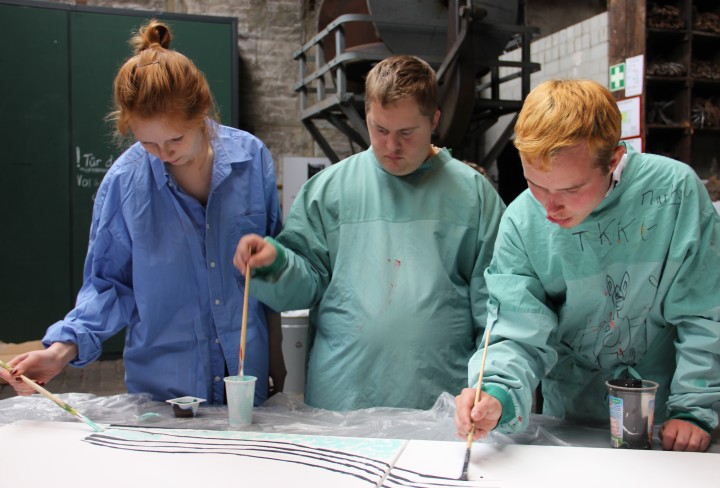
The longstanding co-operation with the Wilhelm-Hartschen-Schule, the special school for mental development located in Solingen, was officially finalised in an education partnership in May 2014.
The special school and the museum agreed to closely share experience, to participate at mutual functions and to support school and museum projects. Both partners hope that the co-operation will have lasting effects, which further improve the quality of the education options offered.
The museum sites in Oberhausen support education partnerships with four schools. Museum visits focus mainly on the subjects history (secondary level I) and art (secondary level II). There is regular co-operation between all schools and the museum, e.g. project weeks in the museum, participation in temporary exhibitions and also conceptual design of small exhibitions by pupils. The schools participated in exhibition "Feuerländer - Regions of Vulcan" with their own project ("Transatlantic Bridge") as part of the programme for the Cultural Capital 2010. In September 2012 the partner schools developed their own programme for the temporary exhibition “Stadt der Guten Hoffnung”. (Town of Good Hope).
The museum regularly participates at schools functions with an information stand in order to provide details of what it offers and about the school partnerships.
The schools in detail:
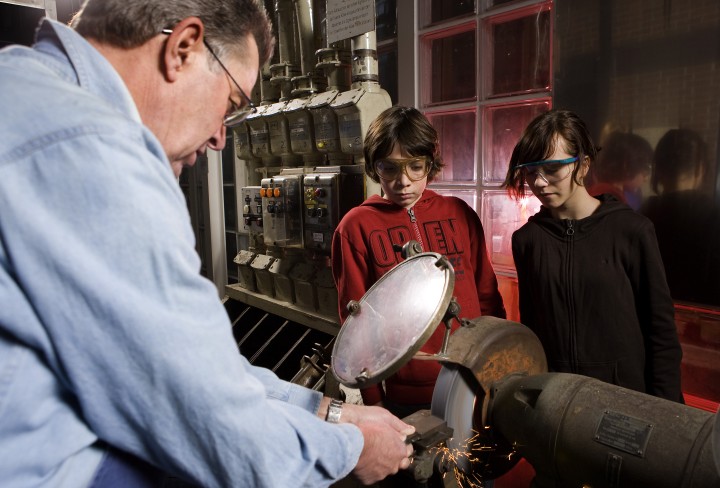
This school partnership exists since November 2006. It relates mainly to co-operation in connection with the permanent exhibition “Schwerindustrie” (Heavy Industry). Apart from various guided tours the school has already carried out project weeks at the museum and the school orchestra accompanies events at the museum.
As part of the project “Spurensuche” (Search for Evidence) the pupils from the grammar school in the GHZ Dinslaken presented an exhibition comprising eight exhibition units in the gallery of the Zinkfabrik Altenberg (Zinc Factory) which they entitled “Spuren durch den Krieg” (Trails through the War).
This co-operation exists since November 2007. In addition to museum visits as part of the history course, several art projects have also been realised in the museum.
This partnership focusses not only on the Zinkfabrik Altenberg (Zinc Factory) and the St. Antony-Hütte (Ironworks) but also the Textilfabrik Cromford (Textile Mill) in Ratingen. Together with a scientist from Siegen University, the school and the museum are currently developing a museum education programme on the topic of industrialisation as part of a project.
At the instigation of the school, this new co-operation came into being with the official signing of the contract in summer 2009. Naturally classes from this school also use the permanent exhibition “Schwerindustrie” (Heavy Industry) for the lessons. Currently a project is getting underway which looks into the future use of steel in building construction.
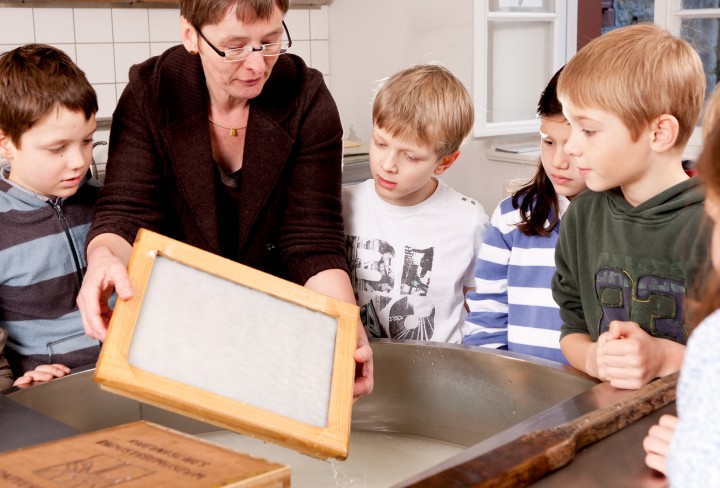
The longer-standing relationship between the primary school and the museum was officially affirmed in a contract in summer 2009. For the school the co-operation with the LVR-Industriemuseum constitutes a valuable enrichment of the curriculum. Especially for children of primary school age an activity-oriented, visually-oriented learning situation in the historic paper mill is particularly important. Due to the close proximity school classes frequently visit the museum to complement lessons in art, social studies (local history) and German language.
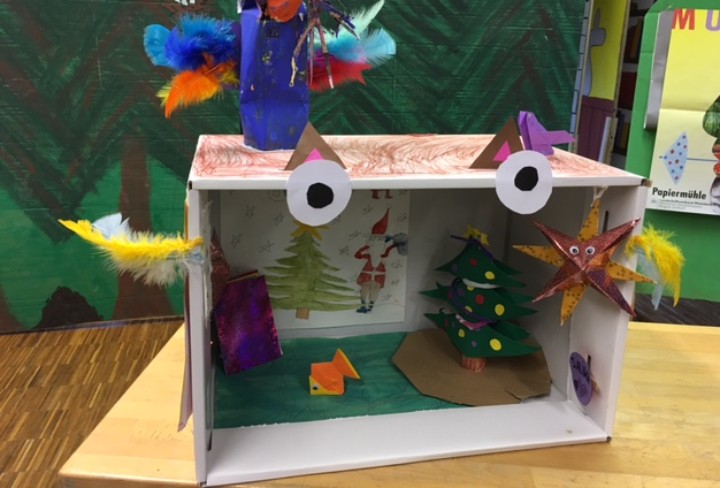
In 2015 the LVR-Industriemuseum signed a co-operation agreement with the GGS An der Strunde in connection with the Education Partnership NRW Museum and School. In past years the museum had already co-operated with primary school. The stream Strunde and the topic water were naturally a mutually important subject.
In addition the school took part in several Museobilbox-Workshops “Leben in der eigenen PapierStadt” (Life in our own paper town) in 2015 and 2016.. Under the motto “Kultur macht stark” (Culture is an asset), 100 children learned about the museum in intensive workshops, creatively designed their own boxes and presented these to family, friends and other visitors to the exhibition.
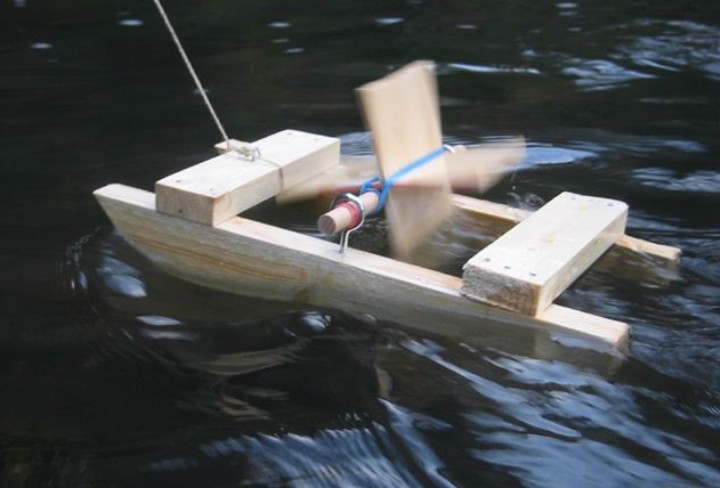
In 2015 the LVR-Industriemuseum signed a co-operation agreement with the KGS Sand in connection with the Education Partnership NRW Museum and School. The main focus of the co-operation is the organisation of project weeks on the topic “Paper and Water” or “Life in the Middle Ages”.
Together with the school the LVR-Industriemuseum developed the new programme “Vom Baum zum Buch” (From a tree to a book) for the museum’s permanent exhibition. Under the heading “Heimat erkunden” (Discover the local area) pupils can first explore the museum in a playful manner and then produce their own small book in a workshop.
Co-operation between the MLK-Gesamtschule and the LVR-Industriemuseum started in 2010 and since the summer of 2011 the school partnership has been officially set out in an agreement. It comprises regular visits of pupils from the school to the museum: Junior high school and senior school pupils take advantage of the options offered by the museum especially for the subject history whenever this matches the curriculum topics. In addition the pupils have set up a “history study group” which meets every 14 days in the museum to delve deeper into the topics covered in the museum. The museum team also visits the school, presents what it has to offer and contributes to functions etc. with interactive stations.
The central focus of the co-operation is the annual "Cromford-Festival", a history-based event for all 8 class age groups on the topic of early industrialisation. Under the motto “Leben und Arbeiten in der frühindustriellen Fabrik und im Herrenhaus” (Life and work at the early industrial factory and in the mansion). The pupils learn about the history of the first factory on the continent in six museum education project sections. This promotes social competence through group work and public presentation of results, competence in diverse methods and media as a result of working with exhibits, sources, theatre etc. as well as motoric function competence through practical orientation.
Co-operation between the MLK-Gesamtschule and the LVR-Industriemuseum started in 2010 and since the summer of 2011 the school partnership has been officially set out in an agreement. It comprises regular visits of pupils from the school to the museum: Junior high school and senior school pupils take advantage of the options offered by the museum especially for the subject history whenever this matches the curriculum topics. In addition the pupils have set up a “history study group” which meets every 14 days in the museum to delve deeper into the topics covered in the museum. The museum team also visits the school, presents what it has to offer and contributes to functions etc. with interactive stations.
The central focus of the co-operation is the annual "Cromford-Festival", a history-based event for all 8 class age groups on the topic of early industrialisation. Under the motto “Leben und Arbeiten in der frühindustriellen Fabrik und im Herrenhaus” (Life and work at the early industrial factory and in the mansion). The pupils learn about the history of the first factory on the continent in six museum education project sections. This promotes social competence through group work and public presentation of results, competence in diverse methods and media as a result of working with exhibits, sources, theatre etc. as well as motoric function competence through practical orientation.
Co-operation between the MLK-Gesamtschule and the LVR-Industriemuseum started in 2010 and since the summer of 2011 the school partnership has been officially set out in an agreement. It comprises regular visits of pupils from the school to the museum: Junior high school and senior school pupils take advantage of the options offered by the museum especially for the subject history whenever this matches the curriculum topics. In addition the pupils have set up a “history study group” which meets every 14 days in the museum to delve deeper into the topics covered in the museum. The museum team also visits the school, presents what it has to offer and contributes to functions etc. with interactive stations.
The central focus of the co-operation is the annual "Cromford-Festival", a history-based event for all 8 class age groups on the topic of early industrialisation. Under the motto “Leben und Arbeiten in der frühindustriellen Fabrik und im Herrenhaus” (Life and work at the early industrial factory and in the mansion). The pupils learn about the history of the first factory on the continent in six museum education project sections. This promotes social competence through group work and public presentation of results, competence in diverse methods and media as a result of working with exhibits, sources, theatre etc. as well as motoric function competence through practical orientation.